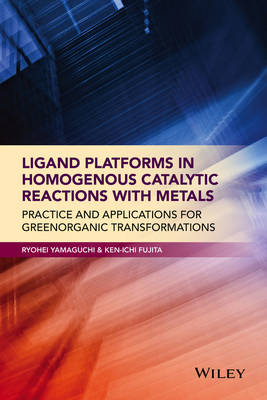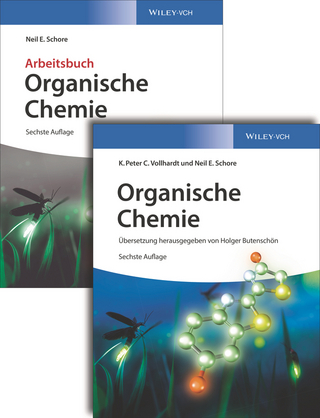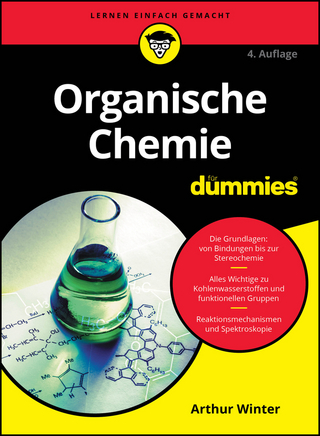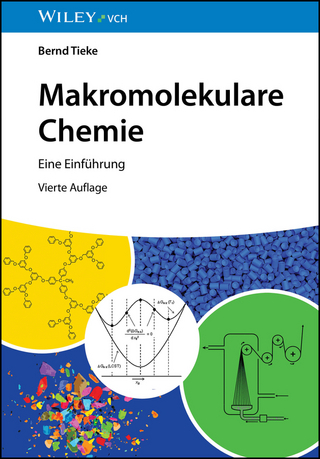
Ligand Platforms in Homogenous Catalytic Reactions with Metals
John Wiley & Sons Inc (Verlag)
978-1-118-20351-4 (ISBN)
Serving as a user's manual for synthetic organic and catalytic chemists, this book guides chemists in the design and choice of ligands to catalyze organic reactions and apply the results for more efficient, green, and practical synthesis.
• Focuses on the role of ligands in metal complexes that catalyze green organic transformations: a hot topic in the area of organic synthesis and green chemistry
• Offers a comprehensive resource to help readers design and choose ligands and understand selectivity/reactivity characteristics
• Addresses a gap by taking novel ligand approaches and including up-to-date discussion on hydrogen transfers and reactions
• Presents important industrial perspective and provides rational explanations of ligand effects, impacts, and novelty
Ryohei Yamaguchi is an Emeritus Professor of Chemistry at Kyoto University, Japan. Previously, he worked as a postdoctoral fellow at University of Minnesota. His research includes the development of selective and catalytic organic reactions by means of metal reagents/complexes directed towards green organic synthesis. Ken-ichi Fujita is an Associate Professor of Chemistry at Kyoto University, Japan. Previously, he worked as a postdoctoral fellow at Yale University, USA and received the Incentive Award in Synthetic Organic Chemistry, Japan in 2006. His research focuses on the development of new catalytic systems for green organic synthesis.
Preface ix
Abbreviation xi
Part I N-Heterocyclic Carbene Ligands in Transition Metal Catalyzed Hydrogen Transfer and Dehydrogenative Reactions 1
1 Oxidation and Hydrogenation Reactions Catalyzed by Transition Metal Complexes Bearing N-Heterocyclic Carbene Ligands 3
1.1 Introduction, 3
1.2 Oxidation of Alcohols Based on Hydrogen Transfer, 3
1.3 Oxidation of Alcohols Based on Dehydrogenation, 10
1.4 Hydrogenation and Transfer Hydrogenation of Carbon–Heteroatom Unsaturated Bonds, 12
1.5 Other Related Hydrogenative Reactions, 21
References, 25
2 Bond-Forming Reactions Catalyzed by Transition Metal Complexes Bearing N-Heterocyclic Carbene Ligands 27
2.1 Introduction, 27
2.2 Carbon–Carbon Bond Formation Based on Hydrogen Transfer, 27
2.3 Carbon–Nitrogen Bond Formation Based on Hydrogen Transfer and Dehydrogenation, 37
2.4 Carbon–Oxygen Bond Formation Based on Hydrogen Transfer and Dehydrogenation, 46
References, 52
Part ii η4-Cyclopentadienone/η5-Hydroxycyclopentadienyl and Related Ligands in Transition Metal Catalyzed Hydrogen Transfer and Dehydrogenative Reactions 55
3 Oxidation and Hydrogenation Catalyzed by Transition Metal Complexes Bearing η4-Cyclopentadienone/η5-Hydroxycyclopentadienyl and Related Ligands 57
3.1 Introduction, 57
3.2 Oxidation of Alcohol Based on Hydrogen Transfer and Dehydrogenation, 59
3.3 Oxidation of Amine Based on Hydrogen Transfer, 68
3.4 Hydrogenation and Transfer Hydrogenation of Carbonyl Compounds, 71
3.5 Hydrogenation and Transfer Hydrogenation of Imines and Related Compounds, 79
References, 84
4 Bond-Forming Reactions Catalyzed by Transition Metal Complexes Bearing η4-Cyclopentadienone/η5-Hydroxycyclopentadienyl and Related Ligands 87
4.1 Introduction, 87
4.2 Carbon–Nitrogen Bond-Forming Reactions Based on Hydrogen Transfer and Dehydrogenation, 88
4.3 Carbon–Oxygen Bond-Forming Reactions Based on Hydrogen Transfer and Dehydrogenation, 97
4.4 Carbon–Carbon Bond-Forming Reactions Based on Hydrogen Transfer and Dehydrogenation, 102
References, 105
Part iii Pincer Ligands in Transition Metal Catalyzed Hydrogen Transfer and Dehydrogenative Reactions 107
5 Dehydrogenation of Alkanes Catalyzed by Transition Metal Complexes Bearing Pincer Ligands 109
5.1 Introduction, 109
5.2 Conversion of Alkanes into Alkenes Based on Hydrogen Transfer, 109
5.3 Dehydroaromatization of Alkanes Based on Hydrogen Transfer, 115
5.4 Alkane Metathesis by Tandem Alkane Dehydrogenation and Alkene Metathesis, 118
5.5 Conversion of Alkanes into Alkenes Based on Dehydrogenation, 121
References, 126
6 Oxidation and Hydrogenation Reactions Catalyzed by Transition Metal Complexes Bearing Pincer Ligands 128
6.1 Introduction, 128
6.2 Oxidation of Alcohols Based on Hydrogen Transfer and Dehydrogenation, 128
6.3 Dehydrogenation of Amines, 137
6.4 Hydrogenation and Transfer Hydrogenation of Carbon–Heteroatom Unsaturated Bonds, 141
References, 157
7 Bond-Forming Reactions Catalyzed by Transition Metal Complexes Bearing Pincer Ligands 159
7.1 Introduction, 159
7.2 Carbon–Carbon Bond Formation Based on Hydrogen Transfer, 159
7.3 Carbon–Nitrogen Bond Formation Based on Hydrogen Transfer and Dehydrogenation, 161
7.4 Carbon–Oxygen Bond Formation Based on Hydrogen Transfer and Dehydrogenation, 173
References, 182
Part iv Bidentate and Miscellaneous Ligands in Transition Metal Catalyzed Hydrogen Transfer and Dehydrogenative Reactions 183
8 Oxidation and Dehydrogenation of Alcohols and Amines Catalyzed by Well-Defined Transition Metal Complexes Bearing Bidentate and Miscellaneous Ligands 185
8.1 Introduction, 185
8.2 Oxidation of Alcohols Based on Hydrogen Transfer with Oxidant, 185
8.3 Dehydrogenative Oxidation of Alcohols without Oxidant, 209
8.4 Oxidation of Amines Based on Hydrogen Transfer and Dehydrogenation, 220
References, 224
9 Hydrogenation and Transfer Hydrogenation of Carbon–Heteroatom Unsaturated Bonds Catalyzed by Well-Defined Transition Metal Complexes Bearing Bidentate and Miscellaneous Ligands 228
9.1 Introduction, 228
9.2 Hydrogenation and Transfer Hydrogenation of Carbonyl and Related Compounds, 229
9.3 Hydrogenation and Transfer Hydrogenation of Imines and Related Compounds, 263
References, 274
10 Bond-Forming Reactions Based on Hydrogen Transfer Catalyzed by Well-Defined Transition Metal Complexes Bearing Bidentate and Miscellaneous Ligands 278
10.1 Introduction, 278
10.2 Carbon–Carbon Bond-Forming Reactions Based on Hydrogen Transfer, 279
10.3 Carbon–Nitrogen Bond-Forming Reactions Based on Hydrogen Transfer, 296
10.4 Carbon–Oxygen Bond-Forming Reactions Based on Hydrogen Transfer, 321
References, 330
Index 335
| Erscheint lt. Verlag | 20.1.2015 |
|---|---|
| Verlagsort | New York |
| Sprache | englisch |
| Maße | 164 x 244 mm |
| Gewicht | 635 g |
| Themenwelt | Naturwissenschaften ► Chemie ► Organische Chemie |
| Naturwissenschaften ► Chemie ► Physikalische Chemie | |
| ISBN-10 | 1-118-20351-8 / 1118203518 |
| ISBN-13 | 978-1-118-20351-4 / 9781118203514 |
| Zustand | Neuware |
| Informationen gemäß Produktsicherheitsverordnung (GPSR) | |
| Haben Sie eine Frage zum Produkt? |
aus dem Bereich


